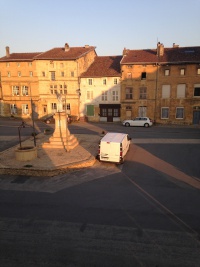Les Plus Beaux Villages de France
From The Art and Popular Culture Encyclopedia
| Revision as of 09:38, 14 May 2007 WikiSysop (Talk | contribs) ← Previous diff |
Revision as of 19:56, 25 August 2022 Jahsonic (Talk | contribs) Next diff → |
||
| Line 1: | Line 1: | ||
| + | [[Image:View of the Grande Place of Marville, as seen from the window of the chambre espagnole at Auberge de Marville, taken on 19 April 2019.jpg|thumb|right|200px|View of the Grande Place of [[Marville, Meuse |Marville]], as seen from the window of the chambre espagnole at Auberge de Marville, taken on 19 April 2019 | ||
| + | <br><small>Photo © [[JWG]]</small>]] | ||
| {{Template}} | {{Template}} | ||
| - | [http://en.wikipedia.org/wiki/{{PAGENAMEE}}] [May 2007] | + | The '''''commune''''' is a level of [[administrative divisions|administrative division]] in the [[France|French Republic]]. French communes are analogous to [[civil township]]s and incorporated [[municipality|municipalities]] in the United States and Canada, ''[[Municipalities of Germany|Gemeinden]]'' in Germany, ''[[List of comuni of Italy|comuni]]'' in Italy or [[Ayuntamiento (Spain)|''ayuntamiento'']] in Spain. The United Kingdom has no exact equivalent, as communes resemble [[districts in England|districts]] in urban areas, but are closer to [[civil parish|parishes]] in rural areas where districts are much larger. Communes are based on historical geographic communities or villages and are vested with significant powers to manage the populations and land of the geographic area covered. The communes are the fourth-level administrative divisions of France. |
| - | The '''''commune''''' is the lowest level of [[Government|administrative division]] in the [[France|French Republic]]. | + | Communes vary widely in size and area, from large sprawling cities with millions of inhabitants like [[Paris]], to small [[hamlet (place)|hamlets]] with only a handful of inhabitants. Communes typically are based on pre-existing villages and facilitate local governance. All communes have names, but not all named geographic areas or groups of people residing together are communes ({{lang|fr|"lieu dit"}} or {{lang|fr|"bourg"}}), the difference residing in the lack of administrative powers. Except for the [[Municipal arrondissements of France|municipal arrondissements]] of its largest cities, the communes are the lowest level of administrative division in France and are governed by elected officials (mayor and a "conseil municipal") with extensive autonomous powers to implement national policy. |
| + | |||
| + | == Terminology == | ||
| + | A ''{{lang|fr|commune}}'' is a town, city, or other municipality. "[[Commune]]" in English has a historical bias, and implies an association with socialist political movements or philosophies, collectivist lifestyles, or particular history (after the rising of the [[Paris Commune]], 1871, which could have more felicitously been called, in English, "the rising of the City of Paris"). There is nothing intrinsically different between "town" in English and ''{{lang|fr|commune}}'' in French. | ||
| + | |||
| + | The French word ''{{lang|fr|commune}}'' appeared in the 12th century, from [[Medieval Latin]] ''{{lang|la|[[Medieval commune|communia]]}}'', for a large gathering of people sharing a common life; from [[Latin]] ''{{lang|la|communis}}'', 'things held in common'. | ||
| + | |||
| + | == See also == | ||
| + | * [[Lists of communes of France]] | ||
| + | * [[Comune]] (Italy) | ||
| + | * [[Urban area (France)|List of fifteen largest French metropolitan areas by population]] | ||
| + | * [[List of submerged places in France]] | ||
| + | * [[French village]] | ||
| + | |||
| + | {{GFDL}} | ||
Revision as of 19:56, 25 August 2022
|
Related e |
|
Featured: |
The commune is a level of administrative division in the French Republic. French communes are analogous to civil townships and incorporated municipalities in the United States and Canada, Gemeinden in Germany, comuni in Italy or ayuntamiento in Spain. The United Kingdom has no exact equivalent, as communes resemble districts in urban areas, but are closer to parishes in rural areas where districts are much larger. Communes are based on historical geographic communities or villages and are vested with significant powers to manage the populations and land of the geographic area covered. The communes are the fourth-level administrative divisions of France.
Communes vary widely in size and area, from large sprawling cities with millions of inhabitants like Paris, to small hamlets with only a handful of inhabitants. Communes typically are based on pre-existing villages and facilitate local governance. All communes have names, but not all named geographic areas or groups of people residing together are communes (Template:Lang or Template:Lang), the difference residing in the lack of administrative powers. Except for the municipal arrondissements of its largest cities, the communes are the lowest level of administrative division in France and are governed by elected officials (mayor and a "conseil municipal") with extensive autonomous powers to implement national policy.
Terminology
A Template:Lang is a town, city, or other municipality. "Commune" in English has a historical bias, and implies an association with socialist political movements or philosophies, collectivist lifestyles, or particular history (after the rising of the Paris Commune, 1871, which could have more felicitously been called, in English, "the rising of the City of Paris"). There is nothing intrinsically different between "town" in English and Template:Lang in French.
The French word Template:Lang appeared in the 12th century, from Medieval Latin Template:Lang, for a large gathering of people sharing a common life; from Latin Template:Lang, 'things held in common'.
See also
- Lists of communes of France
- Comune (Italy)
- List of fifteen largest French metropolitan areas by population
- List of submerged places in France
- French village


